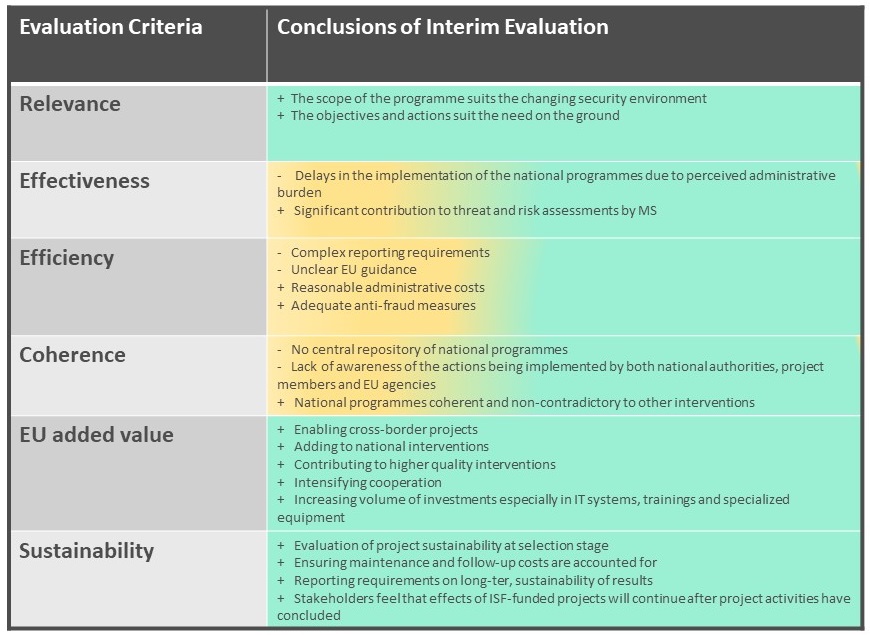The Internal Security Fund - Police

date: 15/03/2021
The area of freedom, security and justice is a shared competence of the EU and its Member States. Responsibility for internal security mainly lies with the Member States, but threats like terrorism, organized crime and cybercrime are cross-border and cross-sectoral in nature. The EU steps in to provide common policies, legislation and practical cooperation in the areas of police and judicial cooperation, border management, and crisis management. The Internal Security Fund (ISF) is one of the main financial instruments [1] supporting the EU’s objectives in combatting security challenges.
The Internal Security Fund was first set up within the multiannual financial framework 2014-2020 to support the objectives of the EU Internal Security Strategy. The ISF addresses situations resulting from newly emerging security threats or other situations that require immediate action which cannot be addressed by Member States acting alone. The ISF provided a total of €4.2 billion for the 2014-2020 financial framework and was divided into a Borders and Visa Component, aiming to facilitate legitimate travel to the EU and to achieve uniformly high level of control of the external borders, and a Police Component, directed towards the fight against crime and terrorism risk and crisis management.

This article focuses on the ISF-Police component, which supports Member States’ efforts to prevent crime and fight cross-border, serious and organised crime and terrorism. ISF-Police also funds projects aiming at strengthening the capacity of Member States and the EU for managing security-related risks and crises effectively, as well as protecting people and critical infrastructure against security-related incidents, including terrorist attacks.
Around 60% of the ISF-Police is implemented by the Member States through their national annual programmes. The rest is managed by the Commission through Union actions, which include: calls for proposals, procurement, direct awards and delegation agreements. For these actions, the Commission approves annual work programmes which define the priorities and objectives for each year, including the priorities for the Calls for Proposals.
The ISF-Police has supported a significant number of projects both managed by the Member States and by the Commission. All Member States except Denmark (and the United Kingdom) participate in the ISF-Police. Examples of beneficiaries include state and federal authorities, local public bodies, non-governmental organisations and private and public law companies. The graph below represents the outcomes achieved by the ISF-police fund by projects managed by Members States for the period 2014-2019.

A book published by the Commission’s Directorate General on Migration and Home Affairs provides examples of funded projects from each Member State. The table below summarizing these examples is a demonstration that concrete actions funded through this instrument can include a wide range of initiatives, such as setting up and running IT systems, acquisition of operational equipment, promoting and developing training schemes as well as ensuring administrative and operational coordination and cooperation.


Under the direct management of the European Commission, Union Actions support specific transnational or particularly innovative initiatives, which can be of benefit to the EU as a whole and is complementary to other funding under shared management with the Member States (see notably the snapshot about Union actions, as well as the compilation of factsheets of some projects financed under Union actions under ISF-Police). In this Protection of Public Spaces newsletter, the Commission publishes regular updates on projects funded under the Union Actions of the ISF-Police as well as news on calls for proposals related to the protection of public spaces. All calls for proposals as well as awarded projects are listed on the website of DG Migration and Home Affairs.
Evaluation of the 2014-2020 ISF-Police
The interim evaluation of the ISF-Police 2014-2020 performed in 2018, assessed positively the implementation of the fund and considered it to be on the right track of reaching its objectives. The evaluation was done according to six criteria and the table below summarized the findings by using green colour for the positive aspects of the evaluation and yellow for the points that need improvement:

The Internal Security Fund for 2021-2027
The regulation for the new Internal Security Fund covering the 2021-2027 multiannual financial framework is not yet formally adopted by the EU legislator. The Multiannual Financial Framework, officially adopted on 17 December 2020, indicates that €1.9 billion will be allocated to the Internal Security Fund. The Internal Security Fund will cover only the ISF-Police component from the previous financial framework. The Borders and Visa component will be moved from the Internal Security Fund to a new Integrated Border Management Fund. With the general objective to contribute to higher security in the EU, the ISF will contribute to:
- increasing the exchange of information between Member States' competent authorities
- enhancing cross-border cooperation, including through intensifying cross-border joint operations
- strengthening Member States' capabilities to combat and prevent crime and reinforcing protection against terrorism, serious and organised crime and cybercrime
The Commission’s proposal for the new ISF addresses the shortcomings encountered in the implementation of the 2014-2020 ISF-Police. The proposal aims to ensure greater flexibility and a more targeted approach in the implementation of the funds. 60% of the Fund will support Member States programmes. The rest will be managed through a thematic facility, subject to mid-term review, allowing for shifting of funds to changing threats and priorities. The administrative and reporting requirements will be simplified in order to improve the efficiency. Specific monitoring tools will ensure more coherence and consistency with other relevant EU funds. The overall monitoring and evaluation process will become more comprehensive and results-oriented.

Follow this newsletter to receive updates on developments of ISF-Police funded projects, events, upcoming calls from proposals and evaluation results related to the protection of public spaces.
For more information on projects, please contact Unit E.1 on Funds Programming and Procedures at the Directorate-General on Migration and Home Affairs of the European Commission (DG HOME) at HOME-NOTIFICATIONS-E1@ec.europa.eu
[1] Other EU funding instruments which can contribute to support the priorities of the Agenda on Security are the Horizon Europe programme for research and innovation, the European Structural and Investment Funds, the EU Justice Programmes, the Customs 2020s Programme and financial instruments for external action.
